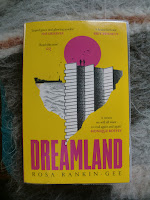Katherine Rundell`s book Why You Should Read Children`s Books, Even Though You Are So Old And Wise has been mentioned before here and no doubt will be mentioned again....and again...and again but especially when I`ve read something as enthralling as Jospeh`s Elliott`s Shadow Skye trilogy.
It is both sad and misguided that children`s books are still so often seen as the poor relation of fiction, that borrowers in the library service where I work still feel the need to apologise shamefacedly for having enjoyed a brilliant Young Adult book, never mind one categorized as Junior Fiction. (The categorization of books is a subject for another time😉)
Saddest of all is that some well known figures in the literary world get so snooty about it (no names, no pack drill but I see you), in the process making the problem worse as well as displaying an astonishing ignorance about some of the factors involved in encouraging children to become confident and enthusiastic readers.
So back to the books that prompted that mini-rant:
Set on an alternative Isle of Skye, this magnificent saga takes its heroes and heroines to the plague devastated mainland of Scotland, across the water to Norway and eventually to the kingdom of England, ruled by a despotic king and his allies, all in an attempt to defend their clan`s homeland. There are terrifying shadow creatures known as sgàilean, blood magic, treachery, deceit and even a huge, vaguely familiar Scottish beast. The reader is completely swept up in the pacy narrative but the books real power lies in the three central characters, Agatha, Jaime and Sigrid and the clever technique of giving each their own distinctive voice and alternating the chapters between them so the story is told from three different points of view.
It works brilliantly: not only is each voice unmistakable (the heading at the top of each chapter to signify who is speaking becomes almost redundant) but their language informs their characters without the need to make explicit observations. Especially delightful is what Elliott refers to in the notes as Sigrid`s "idiosyncratic slang", which absolutely nails her energy and resourcefulness not to mention her wry sense of humour.
Themes of loyalty, trust, love and tolerance run throughout the narrative, challenging our heroes at every turn to make hard choices about what is right and what is wrong. Which is why, when it is handled as well as this, anyone could be proud of saying they`d read it. Or, as Rundell says:
"...the writing we call children`s fiction is not a childish thing.....(rather it) has childhood at its heart, which is not the same thing."



